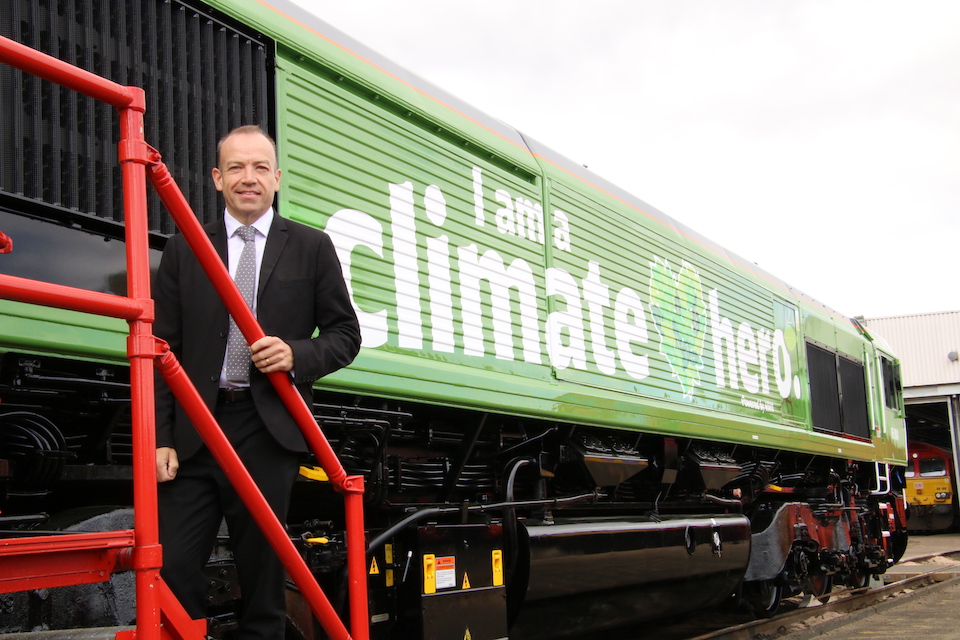Role of rail freight questioned in UK government

Both the houses of the UK government have been examining the commitment to rail freight. Representatives in both the Commons and Lords have asked probing questions of ministers with responsibility for the sector. The recent hike in energy costs and the convening of COP26 in Glasgow prompted the examinations.
In the directly elected House of Commons, which is nominally the government of the UK, the transport secretary was compelled to lay out the government’s position on modal shift. In the House of Lords, the appointed upper house which ratifies or rejects policy laid down in the Commons, the freight sector itself was under examination, in the wake of operators temporarily abandoning electric traction and reverting to diesel on the grounds of economy.
A keen interest in rail freight affairs
In a formal session of questions on transport matters, Chris Heaton-Harris, the Minister of State at the Department for Transport, was cross-examined by his opposition counterpart, Luke Pollard of the socialist Labour and Co-operative party, who holds the portfolio of Shadow Secretary of State for Environment, Food and Rural Affairs. As the elected representative for Plymouth, Sutton and Devonport, his constituency has a keen interest in rail freight affairs. In a written question, Pollard asked the Secretary of State for Transport what steps he is taking to ensure that increasing energy costs do not discourage freight operators from sending freight by rail instead of reverting to road transport.
Heaton-Harris replied that the Government recognised fully business concerns around increasing electricity prices. “We are regularly engaging with the rail freight industry on this issue”, he said. “We are not aware that increasing energy costs are causing freight operators to send freight by road instead of rail.”
London lagging behind
Making a general point, Heaton-Harris said the Government strongly supported the modal shift of freight from road to rail to reduce congestion and carbon emissions from across the freight sector. “This is supported through significant investment in the rail network”, he said. “[This is] to improve its capability and capacity for freight, and through £20m per year grant schemes which support the carriage of freight by rail and water on routes where road haulage has a financial advantage, resulting in the equivalent of 900,000 fewer HGV journeys in 2021/22 [heavy goods vehicles]. “The Government has also committed to introducing a rail freight growth target to encourage the continued growth of the sector and its success in the future”, she concluded.

The government in London has gone to great lengths to praise the virtues of rail freight enthusiastically. However, the industry has been critical of the lack of direction. They say that there is much talk of modal shift but little concerted action to make that ambition a reality. In that respect, London is lagging behind initiatives in another part of the UK.
Criticised for not speaking to the industry
A rail freight growth target has already been set in Scotland by the devolved government in Edinburgh. However, it was more directly on the vexed question of energy prices that the House of Lords spent time debating last week. The devolved governments in Edinburgh and Cardiff have powers over transport matters.
It was appropriate that a Welsh peer, Baroness Jenny Randerson, the centrist Liberal Democrat Spokesperson on Transport, asked what discussions the UK government have had with the representative Rail Freight Group, “and other freight operators who have stopped using electric trains and have returned to using diesel trains because of the rising price of energy.”
Continue to support rail freight
For the government, Baroness Charlotte Vere of Norbiton, the Parliamentary Under-Secretary at the Department for Transport, echoed her Conservative Party colleague from the lower house by reiterating that the Government fully recognised business concerns around increasing energy prices.

“We are regularly engaging with the rail freight industry on this issue”, said Baroness Vere. “The commercial decision to use electric or diesel traction for freight haulage is a matter for individual private sector freight operators”, she said, thereby putting the onus of answering into the hands of the industry, “We continue to support the rail freight sector strongly and recognise that rail freight remains one of the most carbon-efficient ways of moving goods over long distances. On average, rail freight trains currently emit around a quarter of the CO2e emissions of HGVs per tonne-km travelled”, concluded her reply.
You just read one of our premium articles free of charge
Want full access? Take advantage of our exclusive offer




